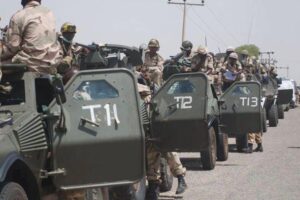“UNVEILING IRONY: The Kaduna Conundrum – Military Capital versus Intelligence Failure in Nigeria” By Chidi Ekeh


The attacks in Kaduna State, Nigeria, and the subsequent failure of the intelligence community to prevent such incidents despite the significant military presence in the region present a complex and deeply concerning situation. Let’s delve into the texts provided to analyze the irony of the situation and discuss the various factors contributing to these events.
Background:
Kaduna State, known as the military capital of Nigeria due to its multitude of elite military institutions, including the Nigerian Defence Academy (NDA), the 1st Division of the Nigerian Army, and others, should theoretically be a bastion of peace and security. However, despite this formidable military presence, the state has been plagued by escalating security challenges, including daring attacks and abductions by bandits and terrorists.
Analysis of Irony:
Contrast between Perception and Reality: The irony lies in the stark contrast between Kaduna’s reputation as a hub for military institutions and the grim reality of ongoing security threats and attacks. Despite being home to prestigious military establishments, the state continues to face significant security challenges, raising questions about the effectiveness of these installations.

Failure of Security Measures: The attacks on educational institutions, such as the abduction of over 280 students and teachers from Government Secondary School and LEA primary school, highlight the failure of security measures to protect vulnerable populations. Despite the presence of numerous military and para-military installations, criminal elements have been able to carry out audacious attacks with impunity.
Inefficacy of Intelligence Gathering: The texts underscore the failure of the intelligence community, including agencies like the Department of State Services (DSS) and the Department of Military Intelligence, to effectively combat terrorism despite increased military incursions. Despite warnings and security alerts regarding potential attacks, there has been a perceived lack of proactive measures to prevent such incidents, indicating deficiencies in intelligence gathering and utilization.
Impact on Civilian Population: The attacks have had profound implications for the affected communities, leading to increased fear, insecurity, and a loss of freedom. Families and communities are grappling with emotional distress, while children involved in abductions face severe and long-lasting psychological effects. Despite the surge in demand for security measures, the cycle of kidnappings persists, creating a climate of fear and instability.

Factors Contributing to the Irony:
Security Lapses: Despite the presence of numerous military installations, security lapses and vulnerabilities persist, allowing criminal elements to exploit weaknesses and carry out attacks.
Ineffective Coordination: Lack of collaboration between intelligence agencies, existing rivalries, and mistrust hinder efforts to address insecurity effectively. The fragmented approach to security governance exacerbates the challenges faced by the intelligence community in combating terrorism.
Misallocation of Resources: The skewed focus on regime security rather than national security has led to a misallocation of resources and a lack of response to impending attacks impacting civilians. The deployment of technical resources and data gathered has not always been tailored to fit the purpose, resulting in fatal casualties and missed opportunities to prevent attacks.
Complex Security Landscape: Nigeria’s complex security landscape, characterized by the presence of multiple armed groups, including bandits, terrorists, and insurgents, poses significant challenges for security forces and intelligence agencies. The evolving tactics and strategies of these groups require adaptive and proactive responses, which have been lacking in some instances.
Conclusion:
The irony of the attacks in Kaduna State being the military capital of Nigeria and the failure of the intelligence community to prevent such incidents underscores the multifaceted nature of Nigeria’s security challenges. Addressing these challenges requires a comprehensive approach that prioritizes national security, enhances inter-agency collaboration, and allocates resources effectively. Urgent reforms are needed to retool intelligence gathering architecture, enhance coordination between security agencies, and address the root causes of insecurity to ensure the safety and well-being of Nigeria’s citizens.
Chidi Ekeh a public affairs commentator writes from Abuja




